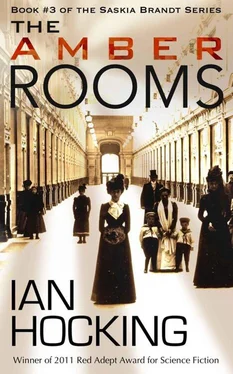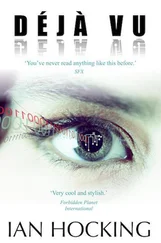She did not have the strength to put the aircraft through S-turns, so the approach would be fast. She took a flight manual from the stowage bin on her left. Because the electronic fuel displays were dead, she had to guess the weight of the aircraft, and from that guess make another about the angle to set flaps.
The Danube loomed.
She set the flaps and held on until her last minutes were gone. The grey water expanded, but the river was much smaller than she remembered. The nose of the aircraft rose as she reduced the thrust.
There were two whoops from the cabin speakers. The same American voice: ‘Pull up! Too low—terrain! Pull up!’
Saskia felt the thickening air through her hands, which shook on the juddering yoke. She swallowed and pulled back as hard as she could. She pushed the intercom.
‘Brace, brace, brace!’
She watched sunlight move across the ceiling switches. Behind her, screams overcame the volume of the alarms and the rushing air.
This won’t hurt. I’m not really here.
She looked at her hands.
At her left hand.
Maybe this time I’ll save them.
She was wearing Jem’s ring.
Maybe this time—
The alarm had stopped. So too had the American voice. The sun no longer swung across the ceiling. There was no vibration through the yoke or the seat and the jet engines were silent. Everything had stopped.
Saskia took her hands from the yoke. She unbuckled her harness and leaned forward until the ground was visible through the window. The Danube was fifty metres below, and real enough, but unmoving. The wavelets were still.
Her mouth hung open.
She rose from her seat and moved to the rear of the cockpit, where she could stand. Between her feet was the body of the pilot. His dry eyes stared into the shadows beneath the seat. Saskia stepped over him, up the slope to the flight deck door. Her trainers squelched.
The door was shut. She imagined the stewardess with the intercom handset pressed against her head, the free hand raised at the terrified passengers. Those passengers would be folded against their knees. Above them, yellow oxygen cups and plastic snoods would dangle.
Saskia opened the door and made
~
two bloody footsteps across a wooden floor. It was an open landing at the rear of a milk bar. She dropped to one knee, looking through a balustrade across the heads of a dozen men. Daylight sank narrow shafts through the smoke, which was wafted back and forth in the wind of a heavy cloth by a boy with a pulley. The men wore long coats. They looked penniless. They were princes.
Saskia looked at the door behind her. It showed the edge of a cot, a dirty mirror and a window covered in wire mesh. The aircraft had gone, along with her bloody footsteps.
‘Come down,’ called the owner of the milk bar. He sat on a high chair near the door. Next to him stood the wrestler called Papashvily who would come for Saskia in Switzerland two years later.
Following the owner’s call, which was friendly enough, the customers, standing to a man, ceased their conversation and stared at her as she took the steps all the way to the earthen floor, soft in her fur boots. She was dressed like a school teacher but for her canvas skirt and hand warmer, in which she hid her amputation.
The silent, staring princes were decked variously in blouses, peasant smocks, and long coats bristling with bullets in lieu of buttons. Some wore bandoliers. Most carried rifles. Fur hats. Fezzes. Luxuriant moustaches. They looked like a theatre troupe. The richest of them wore puffed trousers and leather boots. It was summer and they stank. During her summary inspection, a boy entered the bar; he was steered back to the rocky street by Papashvily.
I know them. All their names. Which are faithful to their wives. Which will die in the bank heist: shot by militiamen or gendarmes, trampled under horses and carriage wheels, hunted down in the weeks to follow.
I know why they have come here this morning, why they wait in the heat, armed, not one of them drinking.
They’re scared.
Scared of him.
There was a creak from the rail above. Saskia, like the men, turned to look.
Simon Ter-Petrossian—Kamo—emerged from the same door as Saskia. Sweat had gathered on his forehead. His eyes were clear.
He hasn’t yet had his accident with the bomb.
‘Come down,’ said the owner of the milk bar. He, alone, seemed insulated from Kamo’s superiority.
Kamo took the steps two at a time and walked into the crowd with his arms wide, ignoring Saskia. He gathered the men to him and kissed them and knocked their caps off and pinched their cheeks. They responded in kind. There were roars and much stamping.
‘Where have you been? Don’t you know the Kuban Host is in town?’
‘When did you arrive in Tiflis?’
‘Why do we have to meet here, at the Adamia, for all love?’
‘What is the name of your beautiful woman?
At this, Kamo’s ebullience winked out. The men saw this change and quietened in a moment. Nobody wanted to be the last to stop laughing. They could read his moods precisely. They were Kamo’s Own; they were to become the core of his notorious Outfit.
‘Who?’ Kamo asked, turning to Saskia. ‘Lynx?’
He laughed.
Nobody laughed with him any longer. They knew his habit: upon a return, he would claim knowledge of a traitor, and conduct the murder personally.
This is it , thought Saskia. I was standing here at the stairs, wondering what to say, when I first met him. The Milkman came to the milk bar.
When Soso entered, admitting cold October air, the men drew back from the doorway and made a channel towards Kamo and Saskia. Soso walked through the gap. He wore a skirted chokha coat and white Caucasian hood. His face was clean-shaven, pockmarked and his hair reddish. There was an imbalance to his gait.
He was struck by a cart during his childhood. Tamaz will tell me this later, over the chessboard.
Soso fixed his amber eyes on Kamo. They hugged. The rubbing of their cheeks struck Saskia as a peculiarly feline greeting. Soso looked at Saskia. She stepped back.
‘Don’t be afraid,’ said Kamo.
Saskia was burning.
Why do I feel the surprise a second time? So this is Joseph Stalin. Deal with it. Old news.
Kamo continued, ‘This is—’
Soso put two fingers to his lips. He shook his head. Then, turning to the crowd, he said, ‘Hang around.’
The men were galvanised. They shook hands with each other, not Soso, as though a crucial deal had been concluded to their advantage. Indeed it had. With these two words, Soso was telling them that another expropriation was in the wind. They did not know the day, the time, the target, or the plan. But they would receive a cut. They would hang around.
Half of the men left the milk bar. Saskia watched them leave. Nobody passed through the line of Soso’s stare, which was centred on her.
‘You regard me with a particular expression, my dear. Could it be that I look familiar to you?’
His Russian was perfect. It lacked the Georgian flavour.
He’s hiding himself. He thinks I’ve recognised him from a mugshot. He sees me as a threat to his liberty. He wonders whether I should be bought off, raped, or dropped from one of the many rocky heights in Tiflis.
The remaining men had dragged tables and chair from the walls and sat on them. Their conversations were gruff and empty. Saskia saw the boy enter once more. This time, nobody stopped him. The ceiling sail began to move. Hot air moved down to them, between her and the man who would become Joseph Stalin, and she said:
Читать дальше












